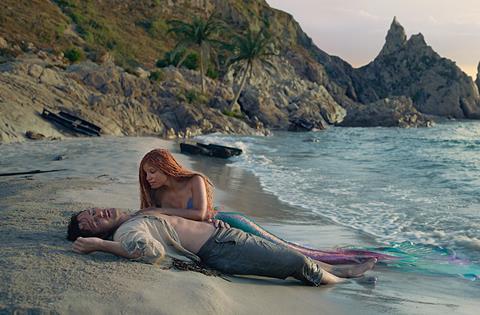Disney’s live-action version of its animated classic doesn’t make enough of a splash.

Dir: Rob Marshall. US. 2023. 135mins
Disney continues its deep dive through its own back catalogue with another live-action remake of an animated classic which, like most of those earlier retreads, struggles to stand apart from the original. While this story of a mermaid who gives up her enchanted life to follow her heart onto the land has been given the full cutting-edge CGI treatment, the slow pacing, often-overwrought emotion and undeniably outdated story mean that it fails to make much of a splash.
Fails to shake off its outdated story origins
That is unlikely to scupper its chances, however. Disney live-action remakes have a history of box office success — 2021’s Cruella, for example, took over £233m at the global box office. Unlike David Lowery’s recent Peter Pan & Wendy, which went straight onto streaming, Disney will roll out The Little Mermaid in an exclusive theatrical window from May 26 — holiday weekends in both the US and UK could help it reach its lofty box office estimates. Early tracking hints that it could take around $110m in the US over its opening weekend alone; almost the same as the original 1989 animation’s domestic haul.
Sticking closely to that film — which itself was inspired by Hans Christian Anderson’s 1837 story — director Rob Marshall and screenwriter David Magee do not attempt to bring anything particularly new to this aquatic adventure. They have ramped up the tension between curious 16-year-old mermaid Ariel (Halle Bailey) and her father Titan (an underused Javier Bardem), who insists that his strong-willed daughter need to stay safe beneath the waves, despite her desire to experience life on land. An attempt, perhaps, to put the emphasis more on a young girl seeking independence, rather than one who gives up everything for a man she barely knows.
While Titan has a formidable power, he cannot compete with Ariel’s curiosity — nor her feelings for Prince Eric (Jonah Hauer-King) with whom she falls immediately in love when she sees him aboard his ship. When Eric is thrown overboard and nearly drowns, Ariel brings him back from the brink of death with her siren song.
A recovered Eric is desperate to find his saviour, and this rough-and-ready royal is given more do than in the first film – including his own new song, ‘Wild Uncharted Waters’ (written by the original film’s composer Alan Menken and producer-lyricist Lin-Manuel Miranda). Hauer-King delivers this with gusto, but it hits notes of soapy cheese rather than emotional longing. (Other musical updates include changing some of the more problematic lyrics to songs like ‘Kiss The Girl’, removing any suggestion that Eric should launch himself at Ariel without her consent.) Eric’s obsession with finding Ariel goes against the wishes of his concerned mother, and a new character, Queen Selina (Noma Dumezweni). Dumezweni brings gravitas to the small role, digging into real-world concerns about setting children free, but this superfluous padding of Eric’s backstory does account for much of the film’s overlong running time.
For her part, Ariel makes a pact with her aunt, sea witch Ursula (played with nefarious glee by Melissa McCarthy, who, despite being lumbered with swathes of expositionary dialogue, leans into the high-camp evil of previous Disney villains). Ariel loses her tail and her voice in return for some legs, and steps out of the waves to pursue a connection with Eric. The catch is that they have to share a ‘true love’s kiss’ (something Disney has long imbued with magical life-changing powers) within three days, otherwise Ariel will be returned to Ursula’s clutches. She is helped by crab Sebastian (voiced by Hamilton star Daveed Diggs) and scatty gannet Scuttle (Awkwafina), who are the film’s best characters, bringing some acerbic wit and much needed levity.
Several years in the making — original shoot dates were delayed by Covid-19, and it eventually filmed in Sardinia and on Pinewood sets —The Little Mermaid is an astonishing technical achievement. A combination of cutting edge underwater camera technology and digital effects work (by a host of VFX houses including Industrial Light & Magic and WETA) plumb the beauty of the ocean depths and there are several standout moments.
One, of course, is the huge step the film takes towards redressing Disney’s poor history of diverse representation, and the fact that Black actress Bailey is stepping — or swimming — so charmingly into the lead. There can be no doubt as to the value that has in itself, and to the the intended young audience, and that is the raison d’etre for a film which otherwise fails to shake off its outdated story.
Production companies: Walt Disney Pictures, Lucamar Productions, Marc Platt Productions
Worldwide distribution: Walt Disney
Producers: John DeLuca, Rob Marshall, Lin-Manuel Miranda, Marc Platt
Screenplay: David Magee, based on the story by Hans Christian Anderson and the animation written by Ron Clements and John Muster
Cinematography: Dion Beebe
Production design: John Myhre
Editing: Wyatt Smith
Music: Alan Menken
Main cast: Halle Bailey, Jonah Hauer-King, Melissa McCarthy, Javier Bardem, Noma Dumezweni, Jessica Alexander, Awkwafina, Daveed Diggs, Jacob Tremblay






![The Brightest SunScreen[Courtesy HKIFF]](https://d1nslcd7m2225b.cloudfront.net/Pictures/274x183/3/5/0/1448350_thebrightestsunscreencourtesyhkiff_312678.jpg)















![The Brightest SunScreen[Courtesy HKIFF]](https://d1nslcd7m2225b.cloudfront.net/Pictures/100x67/3/5/0/1448350_thebrightestsunscreencourtesyhkiff_312678.jpg)

